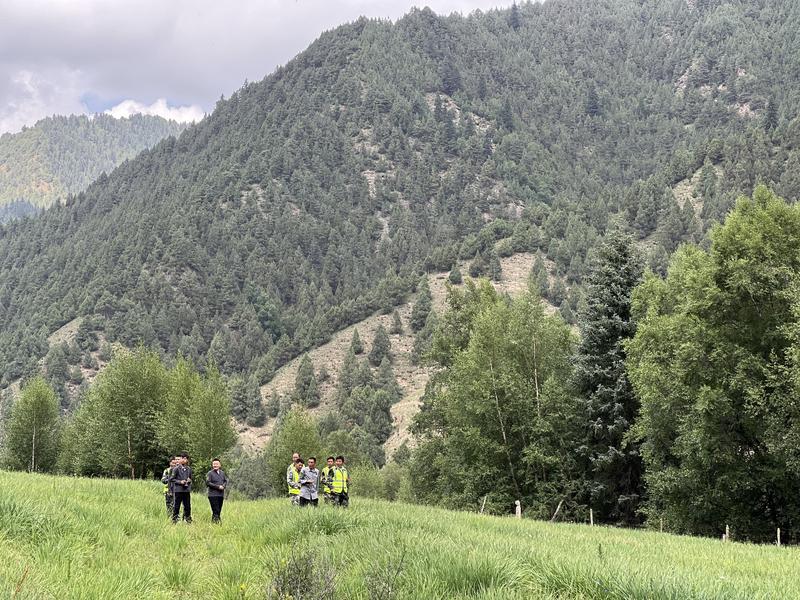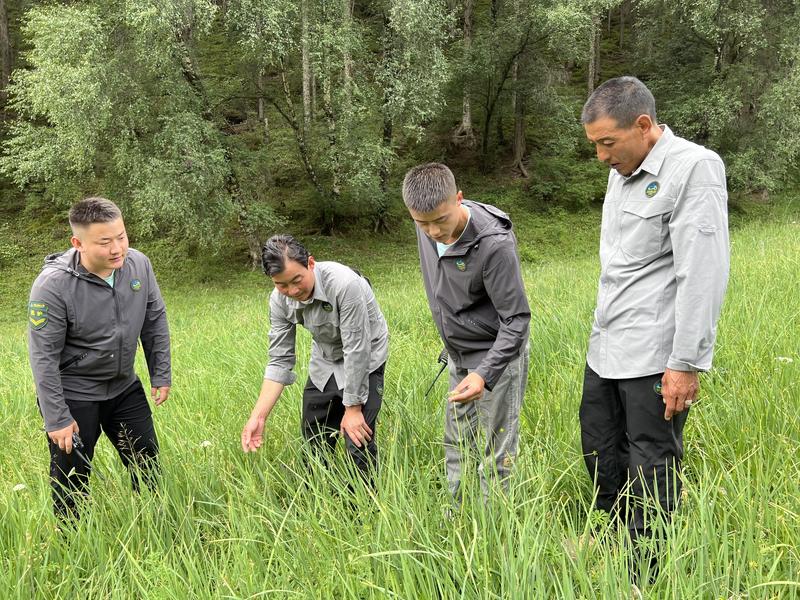Local youngsters join conservation stations across the Qilian Mountains that are tasked with protecting the environment and the wildlife that populates the vast national park, Xu Haoyu reports.
 The main job of the custodians is to keep the environment on the mountains clean, monitor the ecosystem and supervise wildlife and human activities in the nature reserve. (XU HAOYU / CHINA DAILY)
The main job of the custodians is to keep the environment on the mountains clean, monitor the ecosystem and supervise wildlife and human activities in the nature reserve. (XU HAOYU / CHINA DAILY)
Among the Qilian Mountains in Qinghai province, there are 40 standardized ecological management and conservation stations located from east to west.
According to statistics, last year, 1,265 custodians patrolled 44,000 times and their footprints covered a distance of 1,347,000 kilometers. On average, each person had to patrol a distance of 100-200 km every month in the mountains.
I am sure that these young people will be able to take the baton from the old custodians in the future and continue to bring peace and development to the mountains.
Zhang Junshan, manager, Sigou Ecological Management and Protection Station, Qilian Mountain National Park (Qinghai)
These custodians are ordinary people, and the mountains are covered with their tracks. It's not an easy job, but young people are joining in greater numbers.
As one of the major mountain ranges in China, the Qilian Mountains feature wide valleys and 16 parallel ranges running from northwest to southeast.
The Sigou Ecological Management and Protection Station, which is located in Zhugusi village, Zhugu town, sits at the easternmost corner of the range.
At an altitude of 2,450 meters, it was listed as a provincial conservation area in September 2014, and was included in the jurisdiction of the Qilian Mountain National Park (Qinghai) in September 2017.
The area is rich in flora and fauna, hosting such wildlife as snow leopards, roe deer, brown bears, blue sheep, blood pheasants, blue-eared pheasants, Tibetan snowcocks, wolves, alpine musk deer, foxes, otters and marmots. A variety of trees cover the mountains, from Qinghai spruce, birch and aspen, to Qilian juniper, as well as shrubs that include sea buckthorn, caraganas, spirea, azalea and Salix paraplesia.
The station was put into use in September 2019 and covers an area of 1,050 square meters.
The area's water conservation forest, the key focus of protection, occupies a total area of 33,366 hectares.
There are 84 people at the station and, while the average age is 46, 12 of them were born after 1990 and one was born after 2000.
Every morning at 7, when the dew is still clinging to the small white flowers, they go so deep into the woods that there is no telecommunication signal. Sometimes, on a single journey to the mountaintop, the custodians can experience the weather of all four seasons.
The going is arduous, but their determination to patrol is not subdued by poor road conditions.
They switch from truck to motorbikes when the road narrows, patrol on horseback when the road is muddy and, if all else fails, they just walk.
Their main job is to keep the environment on the mountains clean, monitor the ecosystem and supervise wildlife and human activities in the nature reserve.
Through promoting the importance of environmental protection and improving related legal regulations, activities like illegal hunting have been effectively curbed.
 Custodians Niu Tashi Wangchuk (first from left) and Lin Jianyi (second from right) observe the growth of plants with two of their older colleagues during a patrol. (XU HAOYU / CHINA DAILY)
Custodians Niu Tashi Wangchuk (first from left) and Lin Jianyi (second from right) observe the growth of plants with two of their older colleagues during a patrol. (XU HAOYU / CHINA DAILY)
The station rangers patrol 22 days a month, occasionally also at night.
Niu Tashi Wangchuk, 23, is the deputy chief of the station.
"The older generation told me that there were snow leopards hiding in the mountains near the village, so I joined the patrol to find out if that is true," he says.
Before entering the patrol, Niu worked as a tour guide and a real estate agent.
When asked why he found the previous jobs boring, but after six years patrolling, he is still not bored by the work, he says: "The patrol work might seem repetitive, but I can always find something new every day-it might be the new footprint of a snow leopard, getting to know a new kind of plant or developing a deeper understanding of a particular creature."
The affection and sense of belonging to his hometown also supports his passion for the work, he says.
In summer, at around noon, when the mountain breeze is not yet freezing, the custodians open their lunchboxes and have steamed buns with hot salty tea, sitting together in the shade of the trees.
Niu reveals that their conversation during lunch is getting increasingly detailed as they are becoming more familiar with the creatures in the area.
"When I first started working as a custodian, all I would say when I spotted a bird was, 'Look, there's a bird.' But now we are all able to recall the scientific name off the top of our heads and identify its gender by its features," he says.
Lin Jianyi, 25, is the only college graduate among the staff members of the station.
After studying Forest Conservation for three years at Yunnan Forestry Technological College in Kunming, Yunnan province, he returned to his hometown after graduation.
"At school, I learned about wildlife from books. Here, that knowledge comes to life," Lin says.
He reveals that, as local residents become more aware of the importance of protecting the environment, animals are not as vigilant as they used to be. They no longer run away immediately when they see humans.
"It's like the animals have spread the word that humans will not hurt them anymore. We now have many opportunities to get up close to them. I think that peace between humans and animals will last," says Lin.
Lin adds that many researchers come to Qinghai and he really enjoys helping them, guiding them into the deep forest safely or setting up infrared cameras to capture traces of wildlife.
There's always a shy smile and inconspicuous excitement hanging on his face when he talks about his work as a custodian. "No matter where I am or where I might go in the future, I will never stop working on forest conservation," he says.
Zhang Shengyou, 23, has been working as a custodian since he graduated from high school six years ago.
Last March, Zhang participated in the release and monitoring of a snow leopard, which had broken into a herdsman's home. He also saw the body of an antelope it had killed following its release.
"It is indescribably exciting to see something that I had previously only seen on TV at such a close distance," he recalls.
About his future career path, he says in a high-pitched voice, and without hesitation, "I will start thinking about it after another 12 years!"
As a keen shutterbug, Zhang takes his camera on patrol with him every day to record the development of flora and fauna in the Qilian Mountain National Park (Qinghai).
Zhang runs a personal account on Kuaishou, a Chinese short video platform. His videos and pictures showing the beauty of the Qilian Mountains have received nearly 60,000 likes.
"I want to guard the Qilian Mountains and the wildlife here alongside my colleagues and, with my camera, present the charm of the place to more people."
Zhang Junshan, the station manager, says that the young custodians are all very talented and hardworking.
"Some of them are good at expressing themselves, some have outstanding photography skills and some can expertly operate advanced patrol equipment," he says. "I am sure that these young people will be able to take the baton from the old custodians in the future and continue to bring peace and development to the mountains."
Contact the writer at xuhaoyu@chinadaily.com.cn


